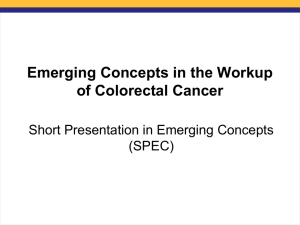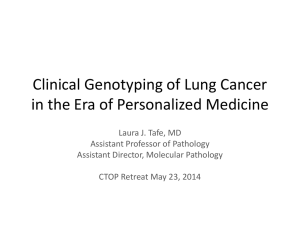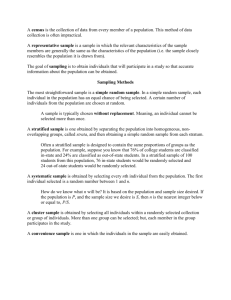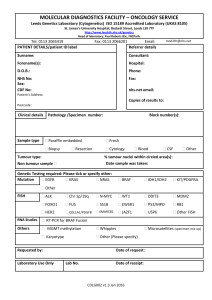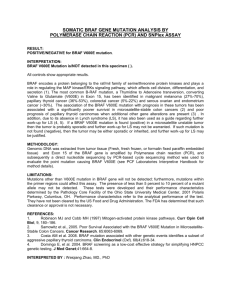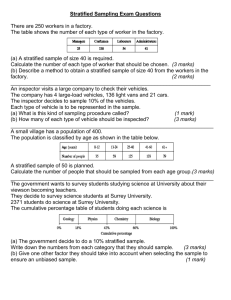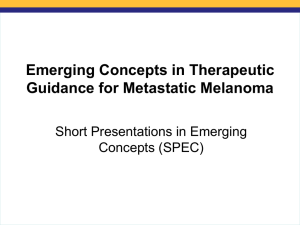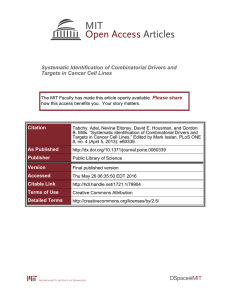Stratified Medicine Programme 2 – Rowena Sharpe
advertisement
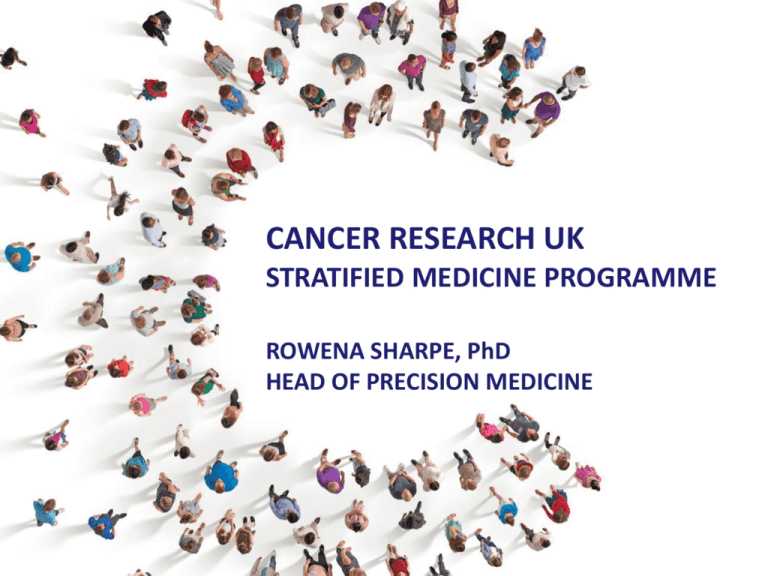
CANCER RESEARCH UK STRATIFIED MEDICINE PROGRAMME ROWENA SHARPE, PhD HEAD OF PRECISION MEDICINE A brief introduction to Cancer Research UK Cancer Research UK (CRUK) • Largest fundraising medical research charity in the world (no government support) • Largest funder of cancer research in Europe • Spent £392m on research in 2014/15 • Support over 5,000 scientists, clinicians and nurses • 75% of the UK’s cancer clinical trial patients are recruited onto CRUK supported trials The Cancer Research UK Network • 18 Experimental Cancer Medicine Centres (ECMCs) • 15 Centres • 7 Clinical Trials Units • 5 core-funded institutes • 4 Cancer Imaging Centres + CRUK Centre for Drug Development + CRT Discovery Laboratories 4 Cancer Research UK’s Ambition Over the last 40 years, cancer survival in the UK has doubled. In the 1970s just a quarter of people survived. Today that figure is half. Our ambition is to accelerate progress an see three-quarters of patients surviving the disease within the next 20 years. 5 We intend to achieve our ambition through a substantial increase in research spend in the following areas Early diagnosis research Basic Therapeutic understanding innovation of cancer Cancers of Cancer Precision substantial prevention medicine unmet need To help deliver these priorities, we will: Launch new funding schemes Invest in our translational network Encourage collaborative approaches Develop the best researchers CRUK STRATIFIED MEDICINE 1 CRUK Stratified Medicine Programme (Phase 1) – In a Nutshell The phase 1 component (2011-2013) of the CRUK Stratified Medicine Programme was a collaborative initiative to undertake large volume genetic testing within the UK Test approximately 9000 patients across the UK over a 2 year programme Stratified Medicine Pilot Programme was driven by CRUK but supported by Pharma, the Government, Diagnostic and IT Companies CR-UK, Pfizer and AstraZeneca fund the clinical and tech. hubs Additional partners, £1.4m £5.5 M £5.6 M TSB grantees, Technology Strategy Board and grantees develop new IT and panel tests Department of Health Chief Medical Officer & National Health Service Additional partners, Bristol Myers Squibb and Roche provide funding for additional tests and Oracle provide analytics platform £5.6 M The CRUK Stratified Medicine Programme was Designed to Demonstrate how Cancer Gene Testing can be done on a Large Scale Central data repository (ECRiC) Research infrastructure Service delivery component The Programme was Delivered Through 3 Technology Hubs, 8 Clinical Hubs and 26 Feeder Hospitals Stratified Medicine Programme Birmingham Cardiff Cardiff University Hospital of Wales Morriston Manchester Birmingham Edinburgh The Christie Royal Infirmary University Hospital Western General Wythenshawe Western Infirmary City Royal Infirmary Salford Singleton Glasgow Royal Southern General Pennine Acute Golden Jubilee Royal Gwent Gartnavel Velindre Victoria Infirmary Stobhill Hospital RMH Cambridge RMH Addenbrooke's Papworth Leeds Marsden St. James's Royal Brompton General Infirmary Infrastructure versus population density Technology Hubs Clinical Hubs Feeder Hospitals CR UK Stratified Medicine Programme – Key Metrics Almost 40,000 gene tests 10,754 patients consented 9,010 samples sent for testing 26 feeder hospitals 8 clinical hubs 6 tumour types 3 technology hubs 1 network A Range of Markers was Tested for Across Six Tumour Types Colorectal Lung Breast Prostate Ovarian Melanoma BRAF EML4 ALK BRAF BRAF BRAF BRAF KRAS BRAF TP53 TMPRSS2ERG TP53 KIT NRAS EGFR PIK3CA PTEN NRAS PTEN PIK3CA KRAS TP53 DDR2 PTEN PIK3CA A Range of Markers was Tested for Across Six Tumour Types Colorectal Lung Breast Prostate Ovarian Melanoma BRAF EML4 ALK BRAF BRAF BRAF BRAF KRAS BRAF TP53 TMPRSS2ERG TP53 KIT NRAS EGFR PIK3CA PTEN NRAS PTEN PIK3CA KRAS TP53 DDR2 PTEN PIK3CA CRUK Stratified Medicine Programme - Initial Findings Lung EGFR mutation only KRAS mutation only BRAF mutation only ALK rearrangement only EGFR + ALK EGFR + KRAS Failed all gene tests Wild-type DDR2 mutation only KRAS + BRAF BRAF + ALK BRAF + DDR2 DDR2 + KRAS • Of 1889 lung cancers, 35% had at least one abnormality • Only 0.65% had more than one. • KRAS was most often mutated (26%), followed by EGFR (8.3%), ALK rearrangement (1.9%) and BRAF (1%). Findings from the CRUK Programme GENERAL ACCEPTABILITY TO PATIENTS: OVER 98% CONSENT NEED TO ESTABLISH ROUTINE CONSENT FOR RESEARCH USING TISSUE AND DATA CRITICAL ROLE OF PATHOLOGY DEPARTMENT IN MANAGING TISSUE SAMPLES ESTABLISH STANDARDS FOR SAMPLE HANDLING, PREPARATION AND PROCESSING IMPACT OF MASS TESTING IN TECHNOLOGY HUBS ACHIEVING CLINICALLY RELEVANT TURNAROUND TIMES VALUE OF QA SYSTEM OPERATIONAL DELIVERY OF A STRATIFIED MEDICINE APPROACH COMPLEXITIES OF NHS IT AUTOMATED DATA EXTRACTION NOT YET RELIABLE CRUK STRATIFIED MEDICINE 2 CRUK Stratified Medicine Programme 2 (SMP2) A TWO PART SOLUTION TO ADDRESS THE KEY OPERATIONAL CHALLENGES OF DELIVERING STRATIFIED MEDICINE: 1. Large volume molecular pre-screening. 2. National Matrix study to deliver the right drugs to the right place for the right patient. • • • Paradigm shift in how the UK delivers precision medicine Future proof: Ability to evolve Initial focus on an area of clear unmet need: lung cancer, one of CRUK’s strategic priorities Why Lung? SMP2: An Alternative Approach Current pathway NHS single gene test NHS Treatment Consent for study Diagnostic biopsy EGFR Single gene test for study Recruit if positive If test negative e.g. BRAF NHS Treatment Recruit to drug 1 Recruit to drug 2 Recruit to drug 3 Collaborative pre-screening Generic consent Panel test e.g. NGS Recruit to drug n •Shared cost •Quicker •Easier for patients •Fewer rebiopsies •Includes rare mutations CRUK Stratified Medicine Programme 2 (SMP2) – A Collaborative Flexible Model To Date: • Combined investment >£20M by current funding partners • Up to 14 AZ/Pfizer drugs Biomarker A : Drug A Biomarker B : Drug B Biomarker C : Drug C Biomarker D : Drug D Biomarker E: Drug E Biomarker F : Drug F Biomarker etc Drug etc Pre-screening • • • • NGS sequencing Currently upto 2000 NSCLC patients screened per year Utilising DNA from routine FFPE biopsies 28 gene multiplexed NGS panel; detects mutations, deletions, CNV and DNA rearrangement National screening to national trial • • • • • • • MATRIX Lung Study Phase 2a signal finding study 8 drugs, 21 stratified arms to begin with Sponsored by the University of Birmingham CI Professor Gary Middleton, Coordinated by Birmingham CRCTU Centralised pharmacy & recruitment across 18 ECMCs Rolling protocol, capable of incorporating new arms Summary – SMP2 will change the way we develop stratified medicines within the UK and provide greater options for patients with lung cancer. – SMP2 is a highly collaborative & flexible model to allow for clinical testing of drugs in many novel patient populations – The programme is a robust National effort across the entire CRUK ECMC network and beyond – A model utilising shared pre-screening provides benefits for patients, researchers and pharmaceutical companies – Takes us another step along the pathway to true precision medicine THE END Rowena Sharpe Angel Building 407 St. John Street London EC1V 4AD Rowena.sharpe@cancer.org.uk
